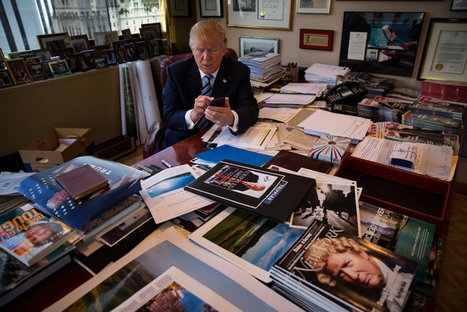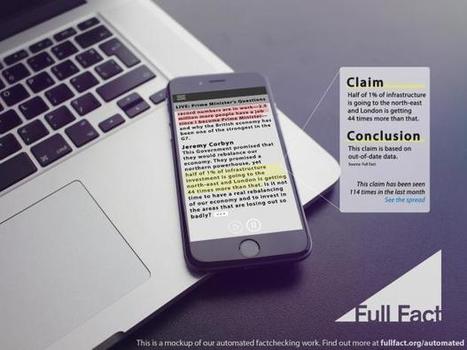 Your new post is loading...
 Your new post is loading...
“Slightly disconcertingly, Lewis says he is “so thrilled” by the controversy. This is not because American voters were misled but because Facebook and Google have been embarrassed and forced to reconsider the complex algorithms they deploy to present news articles to their users. It’s a matter of schadenfreude. Lewis has spent much of the three years since he became chief executive at Dow Jones and publisher of the Wall Street Journal “badgering away” at Google and Facebook, trying to persuade them to change their news distribution methods. “We kept warning them, saying ‘This is an accident waiting to happen – you are treating fake news in the same way as you are treating Wall Street Journal news. This is going to end up biting you.’ And so here it is, biting them!”...
Since Election Day, President-elect Donald J. Trump has proposed a U-turn in American diplomatic relations with Cuba, boasted about negotiations with a major manufacturer, trumpeted false claims about millions of illegal votes and hinted that he might upend current free speech laws by banning flag burning.
All in 140 characters or less.
As news organizations grapple with covering a commander in chief unlike any other, Mr. Trump’s Twitter account — a bully pulpit, propaganda weapon and attention magnet all rolled into one — has quickly emerged as a fresh journalistic challenge and a source of lively debate.
How to cover a president’s pronouncements when they are both provocative and maddeningly vague? Does an early-morning tweet amount to a planned shift in American policy? Should news outlets, as some readers argue, ignore clearly untrue tweets, rather than amplify falsehoods further?...
We — John Borthwick and Jeff Jarvis — want to offer constructive suggestions for what the platforms — Facebook, Twitter, Google, Instagram, Snapchat, WeChat, Apple News, and others — as well as publishers and users can do now and in the future to grapple with fake news and build better experiences online and more civil and informed discussion in society.
Key to our suggestions is sharing more information to help users make better-informed decisions in their conversations: signals of credibility and authority from Facebook to users, from media to Facebook, and from users to Facebook. Collaboration between the platforms and publishers is critical. In this post we focus on Facebook, Twitter, and Google search. Two reasons: First simplicity. Second: today these platforms matter the most.
We do not believe that the platforms should be put in the position of judging what is fake or real, true or false as censors for all. We worry about creating blacklists. And we worry that circular discussions about what is fake and what is truth and whose truth is more truthy masks the fact that there are things that can be done today. We start from the view that almost all of what we do online is valuable and enjoyable but there are always things we can do to improve the experience and act more responsibly.
In that spirit, we offer these tangible suggestions for action and seek your ideas.
Google has agreed to fund a project to develop automated fact checking tools amid anger over the prevalent of fake news websites during the US presidential election.
UK fact checking organisation, FullFact, has announced it has been awarded €50,000 (£43,000) by the tech giant’s Digital News Initiative to build the first “fully automated end-to-end fact checking system”.
In a statement, FullFact explained that the system will have two main features.
One will inform readers if something reported as fact has already been proven inaccurate.
The other mode will fact check claims automatically using Natural Language Processing and statistical analysis in real-time – something FullFact said has never been done before – by highlighting the text and having a factbox appear when the user hovers over it....
|
2016 has been a crazy year for social media. A near three-fourths of users are getting their social media fixes via mobile, Twitter is making moves to sell, and Snapchat has unleashed bots that want to use your eyes to create content. But considering the other social media storms we’ve seen over the past year, the fake news story is perhaps the least understood. Critics have spent hours debating the effect these sites had on voters during the election, while Facebook scrambles to filter out these stories under pressure from its users. What few people are talking about, however, is how impressive it is that these websites were able to appear out of utter obscurity, take over newsfeeds, and drive enormous traffic while competing with considerably larger, better funded, and comparatively more reputable media giants. This is a technical feat that many marketers would love to emulate, but it comes wrapped in unethical practices and short-sighted tactics that don’t fit for the overwhelming majority of brands. If we’re able to peel back the layers of deceit, is there anything left for respectable marketers to take away?...
If you thought you heard the last on fake news, you were sadly mistaken.
A Stanford study found that the majority of middle school students can’t tell the difference between real news and fake news. In fact, 82 percent couldn’t distinguish between a real news story on a website and a “sponsored content” post.
Of the 8,704 students studied (ranging in age from middle school to college level), four in ten high-school students believed that the region near Japan’s Fukushima nuclear plant was toxic after seeing an unsourced photo of deformed daisies coupled with a headline about the Japanese area. The photo, keep in mind, had no source or location attribution. Meanwhile, two out of every three middle-schoolers were fooled by an article on financial preparedness penned by a bank executive.
It seems that those surveyed in the study were judging validity of news on Twitter based on the amount of detail in the tweet and whether or not a large photo was attached, rather than focusing on the source of the tweet.
The WSJ, which first reported on the study, says that a big part of solving this problem among young people comes down to education, both at school and at home....
The day after the election, news began swirling around social media that New York Times columnist David Brooks had called for President-elect Donald Trump’s assassination. Snopes managing editor Brooke Binkowski had a feeling it was fake. Because, come on now, would a prominent columnist for a reputable news outlet really make that kind of comment? Snopes has made its business out of correcting the misunderstood satire, malicious falsehoods, and poorly informed gossip that echoes across the internet — and that business is booming. Traffic jumped 85 percent over the past year to 13.6 million unique visitors in October, according to comScore. The site supports itself through advertising, and in the last three years it has made enough money to quadruple the size of its staff.
Sure enough, a bit of Snopes reporting revealed that Brooks had written a column saying Trump would likely resign or be impeached within a year. A news item published on The Rightists claimed Brooks had then said in an interview for KYRQ Radio New York that Trump should be killed. Snopes found The Rightists doesn’t even pretend to traffic in truth. In the site’s “about” section, it describes itself this way: “This is HYBRID site of news and satire. part [sic] of our stories already happens, part, not yet. NOT all of our stories are true!” What’s more, the story’s facts didn’t add up. For example, the site claimed Brooks had made the comments on a radio station — KYRQ — that didn’t exist.
Paul Horner is a professional fake news writer, whose completely made-up story about the Amish committing their vote to Trump got over 134,000 likes on Facebook; his story about Obama signing an executive order to invalidate the election results has over 250,000 likes. This week, The Washington Post’s Caitlin Dewey interviewed Horner--who is stunned that his work gets accepted as true. “I think Trump is in the White House because of me. His followers don’t fact-check anything -- they’ll post everything, believe anything. His campaign manager posted my story about a protester getting paid $3,500 as fact. Like, I made that up. I posted a fake ad on Craigslist… I thought they’d fact-check it, and it’d make them look worse. I mean that’s how this always works: Someone posts something I write, then they find out it’s false, then they look like idiots. But Trump supporters -- they just keep running with it! They never fact-check anything!”...
|



 Your new post is loading...
Your new post is loading...


















Dow Jones CEO rails at Google and Facebook for promoting and not controlling"fake" news. Recommended reading! 9/10